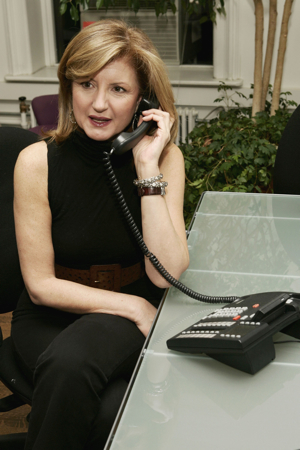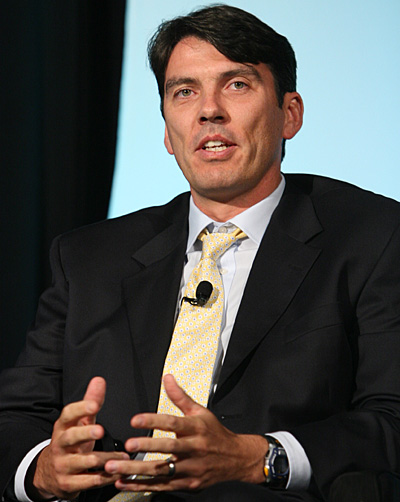If the stories are accurate, AOL CEO Tim Armstrong and Huffington Post founder Arianna Huffington met at a conference last November and had an instant connection. They were so like-minded they were finishing each other’s sentences before the event was over, according to one news account.
 Flash forward to Sunday. While Aaron Rodgers was leading the Green Bay Packers to their fourth Super Bowl victory and I took a nap on my couch, Huffington was putting the finishing touches on her own victory, a deal to sell HuffPo to AOL for $315 million, $300 million of it in cold hard cash, and $15 million in stock.
Flash forward to Sunday. While Aaron Rodgers was leading the Green Bay Packers to their fourth Super Bowl victory and I took a nap on my couch, Huffington was putting the finishing touches on her own victory, a deal to sell HuffPo to AOL for $315 million, $300 million of it in cold hard cash, and $15 million in stock.
That’s quite a profit on a website that Huffington started in 2005 with $1 million to $2 million (news stories on the deal have cited both figures) and that made a reported $31 million last year. According to New York magazine, Huffington’s share of the sale price could be as much as $100 million. Quite impressive for someone who, according to Mahalo’s Jason Calacanis, was not well acquainted with blogging much before that. Calacanis, an Internet industry fixture since the days of Web 1.0, met Huffington when she was still getting her blogging feet wet, he told the crowd at a Federated Media social-media conference in Los Angeles on Tuesday. “I was dating blogs and now I’m ready to go steady,” he remembers her telling him at the time.
She was a quick study. In the years since, HuffPo has evolved from what many thought would be the left-leaning Huffington’s answer to The Drudge Report to one of the most heavily-visited news sites today, drawing 25 million visitors a month. (Read more about Huffington in this profile of her that The New Yorker ran in 2008.)
Lost in the coverage of the deal so far is where it leaves the phalanx of writers and bloggers that both AOL and HuffPo rely on to produce the words, pictures, video, links and other content that gets people to their respective sites.
What’s in it for them?
Will HuffPo, which has amassed a paid staff of 100 but still depends on mostly unpaid bloggers, take a cue from AOL and start paying for posts? Dan Gillmor, director of the Knight Center for Digital Media Entrepreneurship at Arizona State University’s Walter Cronkite School of Journalism and Mass Communication, hopes so. Writing on his Mediactive blog, he says:
I’m hoping that Huffington will recognize how this looks and then do the right thing: namely, cut a bunch of checks to a bunch of the most productive contributors on whose work she’s built a significant part of her new fortune. They’ve earned some of the spoils. I think Huffington is smart enough to know not just the PR value of doing this. And, and feel free to call me naive for saying this, I also think she’s wise enough to know why she should do it on more ethical grounds, too.
 Or will AOL, which uses an in-house editorial staff and freelancers galore, adopt the HuffPo model, relying on more unpaid citizen journalists plus authors, filmmakers, politicians and celebrities who are more than happy to write blog posts for free to promote their latest creative endeavors or causes?
Or will AOL, which uses an in-house editorial staff and freelancers galore, adopt the HuffPo model, relying on more unpaid citizen journalists plus authors, filmmakers, politicians and celebrities who are more than happy to write blog posts for free to promote their latest creative endeavors or causes?
Freelancers who write for AOL say that in the immediate aftermath of the deal’s announcement things are still very up in the air, with staff editors not knowing exactly what’s going to happen.
Also unknown is what will happen to AOL’s Patch hyperlocal news endeavor, which Armstrong has promised will stretch to 1,000 cities by the end of the year, but about which critics say isn’t going very well? And where does it leave Seed, AOL’s user-generated content site?
Those answers are in the hands of Huffington, who as part of the deal is taking over control of editorial creation for the merged company, making her the grand poobah of content.
Some writers have speculated that she’ll take the money and run. I’m not counting on that. With power, reach and budget she’s never had before, Huffington could settle in for the long haul, make herself one of the most powerful people in online media. Take that Tina Brown.
It will be interesting to see how AOL and HuffPo’s competitors respond. I’m thinking of particularly of Yahoo, which bought Associated Content, to bolster its own news endeavors. Then there’s Demand Media – fresh off its initial public offering – Examiner.com, Helium, Studio 101 and all the other content farms, which a combined AOL-HuffPo could take on, especially in view of goals for increasing content and viewership that Armstrong set out in his “The AOL Way” memo leaked by Business Insider just days before the merger was announced.
Of course, AOL has been here before. A decade ago, the company announced a merger with Time Warner they believed would create a digital media colossus “with the potential to reach every American in one form or another.” It never took. The “synergy” that was supposed to take place never materialized, and the companies eventually unwound and went their separate ways.
That word – synergy – always reminds me of the scene in “In Good Company” where the evil CEO Teddy K (in an uncredited cameo by Malcolm McDowell) talks about the great connections that will come out of his company buying up the magazine publisher. The young manager brought into make it happen, played by Topher Grace, totally buys into it, unlike Dennis Quaid’s middle-age ad exec, who sees it for the bull that it is. Before the end of the movie they both get screwed and those promised synergies vanish like the vapors they were.
What do you think? Is this a match made in new media heaven? Or will it become hell on earth for the editors, writers and other freelancers at the bottom of this corporate combination?

Aaron Rodgers was actually leading the Packers to their FOURTH Super Bowl victory… =)
I stand corrected, it is their fourth, though it’s only the second in the team’s modern era. Go Packers!
Michelle